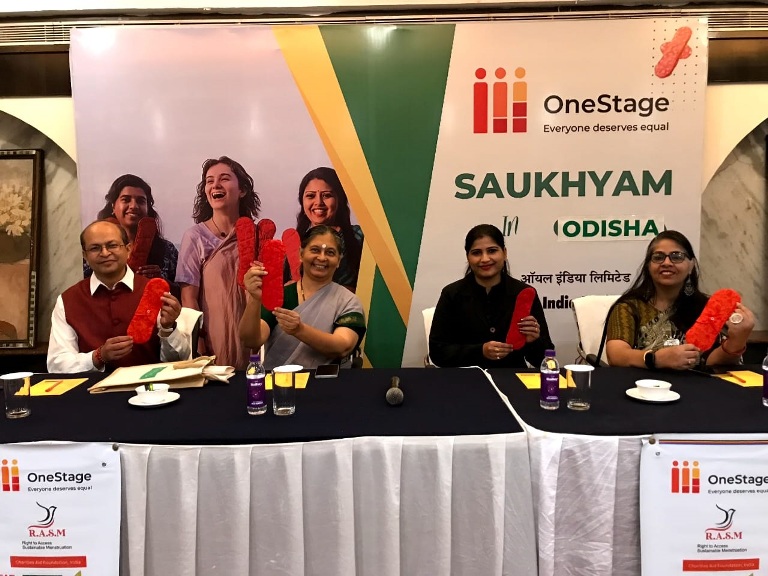TBB BUREAU
BHUBANESWAR, MARCH 20, 2024
In a significant stride towards sustainable menstrual hygiene, Saukhyam’s innovative reusable sanitary pad has emerged as a symbol of eco-conscious innovation. Crafted from organic banana fiber, this pioneering pad has garnered widespread acclaim for its dual focus on environmental sustainability and addressing critical health concerns associated with traditional disposable pads.

L-R – Praveen Bist, CIO of Amrita Hospitals, Anju Bist, Managing Director of Saukhyam Reusable Pads, Subhasmita Rath, Athletic Coach, East Coast Railway, Sneha Mishra, Odisha Menstrual Health and Hygiene Alliance
Anju Bist, affectionately known as the “Pad Woman” of India and Managing Director of Saukhyam, has been a driving force behind this transformative movement. Her passionate advocacy for sustainable menstrual hygiene practices has resonated across communities, catalyzing a shift towards reusable alternatives.
At a pivotal round table discussion held in Bhubaneswar today, Anju Bist emphasized the crucial importance of sustainable menstrual hygiene practices in Odisha. The conference served as a platform to confront the detrimental environmental impact of disposable sanitary pads and champion the adoption of eco-friendly alternatives, notably Saukhyam Reusable Pads.
“Non-biodegradable pads pose a grave threat to our planet, persisting for 500-800 years after disposal and releasing dangerous toxins when burned,” explained Anju. She highlighted the exorbitant cost of traditional pads, contrasting it with the affordability and hygiene benefits of Saukhyam’s reusable pads.
An often overlooked aspect of disposable pads, as Anju revealed, is the environmental toll of tree cutting for their production. In stark contrast, Saukhyam pads utilize banana fiber extracted from agro waste, ensuring no harm to living trees.
Initiated by Amma, Sri Mata Amritanandamayi Devi, Saukhyam aims to offer menstruators a safe and sustainable solution, free from the harmful chemicals found in most disposable sanitary napkins.
Collaborating with the NSS Unit of the Department of Higher Education, Government of Odisha, Saukhyam conducted impactful awareness workshops in colleges across Bhubaneswar and Cuttack. Ramesh Chandra Behera, NSS State Coordinator, expressed optimism about expanding these workshops in the coming year.
Support from various sectors, including the Odisha Menstrual Health and Hygiene Alliance, Oil India, and Indian Railways, underscores the collective effort towards advancing sustainable menstrual hygiene solutions. Oil India’s commitment to establishing a reusable pad factory in Kerala, with plans for a satellite production center in Odisha, signifies a significant stride in this direction.
Praveen Bist, CIO of Amrita Hospitals, emphasized the accessibility and affordability of reusable menstrual pads, underscoring their role as the optimal solution for communities.
With over 5 lakh women and girls embracing Saukhyam Reusable Pads, the impact is tangible, with significant reductions in carbon emissions and non-biodegradable waste. This shift towards sustainable alternatives marks a pivotal step towards a healthier and more environmentally conscious future.
 The Business Bytes
The Business Bytes